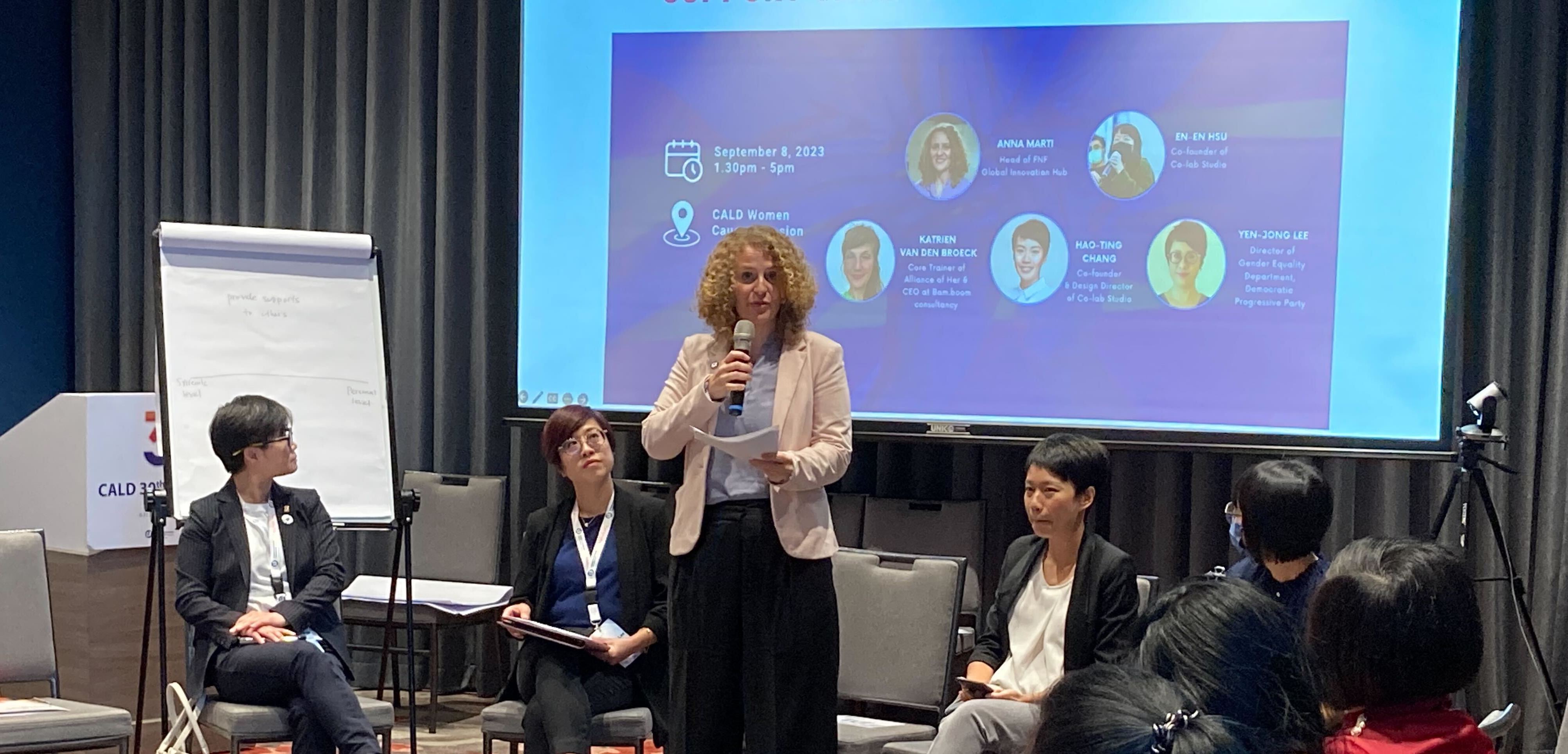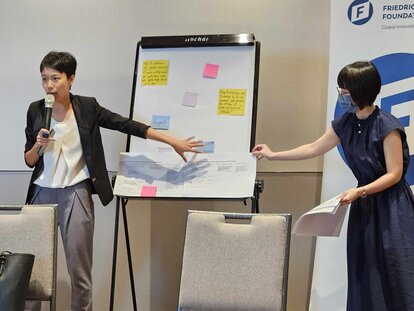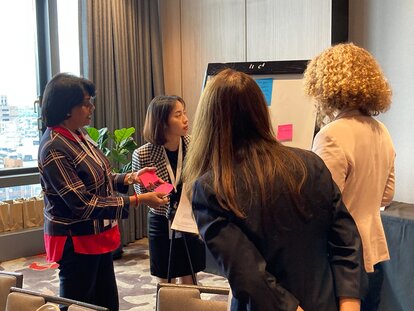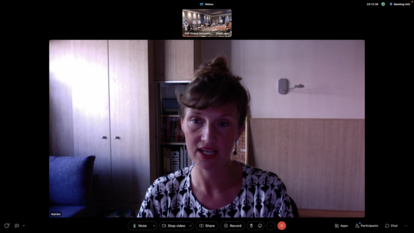Event
How to Make Liberal Parties a Woman-Friendly Workplace?

Ms. Anna Marti, Head of FNF Global Innovation Hub, delivered opening remarks at the 'What Can Liberal Parties Do to Support Their Women Colleagues?' workshop during the Council of Asian Liberals and Democrats (CALD) women caucus event in Taipei.
© FNF Global Innovation HubLiberal political parties around the world certainly stand for women’s rights and gender equality. However, they are also a kind of workplace in the world where women may still encounter all kinds of challenges, including unequal opportunities for promotion, gender stereotype, and even sexual harassment. This is why FNF Global Innovation Hub organized a workshop for women working in liberal parties during the CALD women caucus event. The belief is that by enhancing the working environment for women in liberal parties, liberal parties can develop a more solid strategy for promoting women’s rights and gender equity outside their parties.
Through the workshop and our pre- and post-workshop survey, the participants provided honest observations regarding the current status of working environment in their parties and proposed practical and inspiring initiatives to strengthen the current gender-equality mechanism in liberal parties. In addition, Ms Katrien van den broeck, one of the speakers and the core trainer of Alliance of Her, shared useful and brilliant strategies for forming and strengthening alliances among women across the globe.

Participants were brainstorming ideas at the workshop.
© FNF Global Innovation HubDo Women Colleagues Consider Their Parties Women-friendly?
The participants of this workshop are predominantly women working in member parties of CALD. However, the selection of participants was not based on standard statistical methodology to represent all of CALD’s member parties. Therefore, the survey and discussions in the workshop do not have statistical implications to reflect the holistic picture of CALD member parties. Nevertheless, both the survey and discussions still serve as valuable reference to figure out what we can do to make liberal parties a better workplace for women.
According to the pre-workshop survey, participants generally response positively to the question about whether their parties’ working environments are friendly to women. When asked the degree of gender sensitivity of their superiors and colleagues on a scale of 1 to 5 points, about 45% of the participants gave 4 points and some 18% gave 5 points. When asked how difficult it is to discuss with their superiors/directors when they sense anything that may not be friendly to women, about 40% participants gave 2 points and about 27% of the participants gave only 1 point. It seems like most of the participants considered that their superiors and colleagues have a sufficient level of gender sensitivity and it’s not very difficult to talk with their directors when they feel something may be against women.
Interestingly, after the questions about practical gender-equality mechanisms asked and discussed, problems seemed to surface:
Institutionalized Mechanisms for Gender Equality are Incomplete
Although most of the participants said their parties have mechanisms, departments, or resources for enhancing gender equality in their parties, there are still 18% of participants who said that their parties do not have one, 9% who said that they do not know, and 9% participants who were not so sure about whether their parties have one.
Similarly, when asked whether their parties have sexual harassment prevention mechanism, departments, or resources, there are still 13% of the participants reported the absence of such mechanisms, and 9% were uncertain if their parties have any. The result implies the need to further institutionalize gender equality support within the party and ensure that every colleague is aware of the existence of it.
Insufficient Support for Women to Sustain Work-Life-Family Balance
Many participants also reflected that they have been struggling for work-life balance in the questionnaire and during the workshop, and in the workshop, most of the participants considered they allocated more time to work. Moreover, many participants also mentioned work-family balance is a challenge for them or may even stop them from pursuing their political career.
Decision-making Mechanism inside Parties Is Man-Dominated
Participants also expressed that although some parties have mechanisms to encourage women to become candidates for elections, most of them still feel that the decision-making roles in the political parties are still occupied and controlled by men, and societal and family expectations can still deter women from pursuing leadership positions.
Threats to Women outside Liberal Parties
When asked to share the problems that women faced in their parties or countries, a participant said that she felt small and hoped to be as powerful and free as an airplane to help the people in her country who are still suffering from the government’s oppression against women. Another participant echoed her with a powerful statement, “if there are no freedom, justice, and democracy, gender equality will not exist.” These words underscore the necessity of increasing support for liberal parties located in countries under authoritarian governance.

Participants were brainstorming ideas at the workshop.
© FNF Global Innovation HubWhat Can be Done?
After pointing out challenges that women may face in the workplace, the participants split up into groups to brainstorm solutions to improve the current situation. The following summarizes their proposals and experience:
Innovate and Explore Approaches to Keep Women in Political Careers
A participant shared her experience when dealing with conflict between work and family: when her family situation did not allow her to be at the front line, running elections or leading a party, she found alternative ways to contribute, such as guiding young people in her party. This inspired us to think that liberal parties can actively innovate and explore various job positions, tasks, roles, forms of work, and flexible working hours to retain outstanding colleagues in the party when they face such struggle. Of course, liberal parties should also advocate that men should share equal responsibility for family matters and support their partners’ career.
What Needs to Be Better Institutionalized inside Parties
The survey shows that liberal parties should better institutionalize support for women, and the participants further specify what kind of support needs to be institutionalized during the workshop:
- Enacting Gender Equality as Norms and Written Rules of Liberal Parties
Participants talked about how to create and sustain an all-gender-friendly office and how to ensure that the party has the same level of gender sensitivity when the party leadership consists mostly of men. One participant answered that there should be clear rules and regulations within political parties, and discussions for establishing or adjusting such norms should be held constantly in parties to ensure equality, fairness, and inclusiveness. Gender equality should be integrated both as a written rule and as a cultural norm in the office. This ensures fulfillment of gender equality regardless of who becomes the party leadership.
- A Clear, Accessible, and Written Sexual Harassment Prevention Mechanism
Participants also proposed ideas on how to improve sexual harassment prevention measures. Some of them emphasized that such regulations and guidelines should be clearly structured and written as public documents instead of merely oral warnings. Additionally, parties should actively inform every colleague of such measures because not being informed is one of the main problems disclosed in our survey. A participant mentioned that she appreciates her party for creating one single email address that everyone can directly report sexual harassment to. This highlights the importance of designing sexual harassment reporting mechanisms that prevent victims from having to navigate multiple levels of hierarchy to report. Finally, participants emphasize that the mechanism should be extended to protect women colleagues from being harassed by people outside of parties such as contractors or vendors and at occasions outside of party offices such as campaign events and external meetings.
- Gender Education Should be Mandatory and Seen as Crucial Occupational Knowledge and Skill Requirement
Gender education should be taken seriously in liberal parties. Some participants proposed to establish mentorship mechanisms, set up workshops and networks, and organize training for politicians to enhance their gender sensitivity. A participant proposed that understanding of gender equality should be included as one of the requirements for job application or promotion, so people who want to work in the party or become party leadership will really take gender equality seriously and understand that it is one of the core values of the party.
Such education matters not only to liberal parties but also to many countries, as mentioned by a participant. Drawing on the situation in her home country, this participant mentioned that simply talking about gender equality and LGBTQIA+ rights may incur pressure from society or government due to the religious and political circumstances in her country. Therefore, gender education in a party can be a small but essential step to persistently sustain a strength to push gender equality forward for the entire country.
- Emotion Education Should be Offered
Another participant pointed out that emotion education should also be offered, because some sexual harassment cases occur when a colleague tries to develop a relationship with another colleague. Human beings should have the freedom to have and to express emotions and feelings towards others, but people should still treat colleagues with respect. It’s crucial to seek consent from others and avoid our arbitrary interpretation of reactions based on gender stereotypes. Additionally, it is imperative to prohibit sexual harassment and violence in the name of love. Such education is not necessarily offered in schools around the world due to culture differences, so it is necessary to supplement it in the workplaces of political parties.
- Create A Safe Space to Express and Debate
Participants mentioned that parties can organize friendly debates to help people think from a perspective with which one might not agree, thus fostering empathy and understanding the importance of gender education, and encouraging women to be assertive and vocal. However, Katrien reminded us that it’s essential to have a good moderator to ensure that such a debate is conducted under the principle of gender balance and proper code of conduct because that is the key to encourage people to speak up and be part of the discussion.
- Building Women Political Workers Network Across the World
Forming or joining an international network of women political workers may help women political workers to find solutions to improve women’s rights in their political parties or country. In an international network, members can tentatively step out of the brutal struggle and competition for power in domestic politics, and thus can honestly speak out the problems and openly discuss for solutions.
In addition, members from other countries can inspire us with their experience and prevent one from getting trapped in the context of one’s own domestic politics. Finally, the network itself will be a powerful force to support women around the world. Katrien used the Alliance of Her, a network that provides insights, help, training, and opportunities to build connections for women working in politics, as an example to show the participants how such a network is created and functions.

Ms. Katrien Van den broeck shared her experience with the participants.
© FNF Global Innovation HubThis Discussion Will Continue
These are still just a very small part of all the inspiring ideas that all the participants contributed in this workshop, and we thank the Co Lab, the facilitator team, for designing a discussion module that encouraged participants to speak out their thoughts comfortably. Before the end of the workshop, the speaker Katrien shared two very important concluding remarks, which will stimulate participants to continue their discussion and action after they walk out from this workshop venue. Firstly, she wanted everyone to ask themselves again, “Why are you politically engaged? And how?” These questions sound like for beginners, but they can remind every participant what motivates them to work in politics and how they use women’s unique abilities and resilience to overcome every challenge and arrive where they are now.
Secondly, view your political career as a marathon. None of the challenges should be viewed as stopping points, as they are just episodes in a political career journey. Moreover, it will prevent women from being trapped in a zero-sum game when more than one woman has to compete for the same position. In a political career marathon, an election or a promotion will be just one of many opportunities. Women can form alliances and offer support through strategic discussions; for or example, one woman may say, “let me run for this election this time, and I promise I will support you in the next or other election. “ The point is for women to support each other, enabling more of them to attain positions of power and influence as decision makers.
*Edited by Judy Peng, Communications Officer / Drafted by Ko-Hsuan Lu, Admin Assistant, and Rebecca Kuo, Project Assistant of FNF Global Innovation Hub
